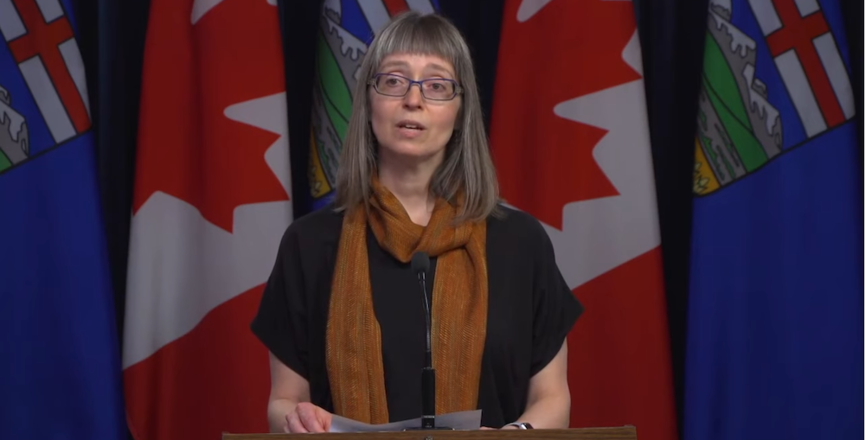“The risk to Albertans is still low,” the government of Alberta’s official website soothingly assured us yesterday afternoon, the day the World Health Organization officially declared the effects of the coronavirus swiftly coursing ’round the globe to be a pandemic.
This may reassure some of us. Others, not so much.
Yesterday afternoon, Alberta had 19 confirmed cases of infection by the virus, the website said. Canada had 98.
Two weeks ago, with a population not quite double Canada’s, Italy had 322 confirmed coronavirus cases. One week ago, wrote Yascha Mounk in a grim piece published yesterday by The Atlantic, it had 2,502 cases.
Yesterday, Italy had 12,462, according to the Johns Hopkins University coronavirus COVID-19 dashboard. By the time many readers click its link tomorrow, there will almost certainly be many more.
Italian doctors are starting to triage patients, based on, among other things, their age, to assure “the appropriate allocation of limited health resources,” according to a document published by the Italian College of Anesthesia, Analgesia, Resuscitation and Intensive Care.
So we ought not to feel too smug, or too confident, about the low number of cases in Alberta or the seeming hesitation of the Alberta and Canadian governments to take strong measures such as banning large public gatherings or temporarily closing schools and universities now, while they might have a chance of preventing our health-care system from being overwhelmed.
If China’s aggressive interventions, widely criticized in the West at the time as authoritarian, had been brought in one week earlier, an analysis by British scientists indicates, 66 per cent fewer people would have been infected.
“From a purely scientific standpoint, putting in place a combination of interventions as early as possible is the best way to slow spread and reduce outbreak size,” professor Andrew Tatum of the University of Southampton told The Guardian.
From a purely political perspective, however, it’s hard to know if aggressive countermeasures are even possible in an increasingly neoliberalized country like Canada — let alone the hot mess south of the 49th parallel, where there still aren’t enough tests to assess everyone who may have COVID-19.
Yesterday, U.S. President Donald Trump moved to counter what he called the “foreign virus” with his usual mélange of illogicalities — among other things, banning travel from Europe for 30 days, but not from the United Kingdom. Call it the Brexit advantage, if you like.
Meanwhile Trump’s supporters in the fetid swamp that is the right-wing mediasphere continue to label efforts to corral the coronavirus as fraudulent, a Chinese plot to wipe out the U.S. economy or a backhanded scheme to re-impeach the president.
Alas, this is bad news for Canada because Trump’s mixed messaging and general incompetence are likely not only to hugely increase the impact of the virus in the United States, but to send the disease storming across the world’s longest undefended border. It is not too much to predict that our proximity to our increasingly unhinged neighbour will cost lives in Canada.
But it is also reasonable to expect the increasingly Republicanized Canadian right, including its (ironically, given who is most vulnerable to COVID-19) elderly base, will respond exactly the same way as do loyal Fox News believers south of the Medicine Line.
It is increasingly evident that whatever you say about the difficulty of fighting a new and aggressive disease like COVID-19, effective public-health policy and neoliberal economic doctrine are incompatible. You can have one. You can have the other. You can’t have both.
Alberta is coasting toward a crisis with a medical system under sustained attack by the United Conservative Party government of Premier Jason Kenney. It seems to be functioning well now, having just come through four atypical years during which the NDP government of Rachel Notley didn’t try to undermine it at every turn.
But despite the reassuring presence of Dr. Deena Hinshaw, Alberta’s chief medical officer of health and the public face of the fight against the coronavirus, the Kenney government’s ideologically motivated efforts to privatize broad swathes of health care, its fights with physicians, nurses and other health workers, and its politicized defunding of other essential health services all continue to percolate behind the scenes.
Given the severity of the crisis, would Kenney’s government be prepared to legislate mandatory paid sick time for all workers, even as a temporary measure, to help halt the spread of the disease? Highly unlikely, given its ideological predilections.
While Kenney might put aside his market-fundamentalist principles to bankroll the fossil fuel industry in its parallel crisis, it seems unthinkable that he would respond with similar vigour to protect the health of Albertans.
He’s much more likely to use the dual crisis caused by COVID-19 and tumbling oil prices to spread the intellectual virus of neoliberalism, or as just another stick with which to beat his rival in Ottawa, Prime Minister Justin Trudeau.
It’s almost as if the this new novel coronavirus has evolved to exploit the vulnerabilities of the modern neoliberal state — two-tier health care, low wages, precarious work, weak unions, the gig economy, each one of them nurturing the conditions that make the spread of the virus harder to stop.
David Climenhaga, author of the Alberta Diary blog, is a journalist, author, journalism teacher, poet and trade union communicator who has worked in senior writing and editing positions at The Globe and Mail and the Calgary Herald. This post also appears on his blog, AlbertaPolitics.ca.
Image: Government of Alberta



